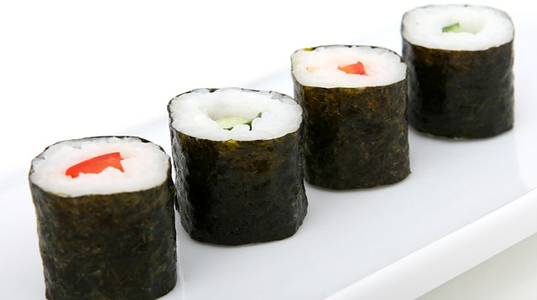I have recently fallen in love with a food that has been included in the Asian diet for centuries. Something that at fight mention may make you think of something to include in a fish tank rather than on a plate but I am here to let you know it has another (potentially better) use. What is this food? I am talking about seaweed! Now before you stop reading this article and laugh at the thought of including it in your diet, if you keep reading you will discover this food may do amazing things for your health.
If you do not know much about seaweed there are 4 groups of seaweed algae:
1 Green algae (Chlorophyceae)
- Red algae (Rhodophycae)
- Blue-green algae (Cyanophyceae)
- Brown algae (Phaeophyceae).
The red, brown and green seaweed types have been studied and suggested to have the health promoting factors for your health.
Why should you consider including seaweed as part of your diet?
- Seaweed has been reported to help you lose weight.
How? Components called polysaccharides and polyphenols slows the activity of the enzymes or small parts of a reactions, needed to break down and use the food and drink we take into our body from working properly. So when you include seaweed as part of your meal the amount of energy your body gets from what you eat is less. Over time this may help with weight loss.
- It has these ‘goodies’ for your body:
- Dietary fibre (which helps you stay regular and feeling fuller for longer)
- Omega-3 fatty acids (a really healthy form of fat for your body which promotes lots a healthy heart and may improve mood).
- Essential amino acids (so you can build strong muscles)
- Vitamins A,B,C and E. (helping your body function optimally)
- Phytochemicals (helping your immunity and cells to stay healthy)
- Seaweed may decrease your risk of:
- Type 2 Diabetes
- High blood pressure
- Seaweed may help your thyroid work well.
- Seaweed may prevent viruses, fungi and bacteria in your body by influencing the health of the gut.
- Seaweed may help the tissues in your body to heal.
- Seaweed may delay the ageing process!
I hope you are convinced seaweed is awesome!
Here are some ideas how to include it in your diet:
- Try dried seaweed as a snack. Either by itself of adding it as a wrap substitute to have with a small tin of tuna.
- Sushi!!! Sushi is becoming cheaper and cheaper to buy ‘on the go’ or try making some at home (the fresh seaweed has an amazing crunchy texture when fresh and you get to add all the ingredient you feel like)
- Kelp noodles! These can be bought from many health food shops and even come in different flavours including berry.
- Add some seaweed instead of the flavouring in two minute noodles. Instead of adding the flavouring to the traditional two minute noodles, use some fresh or dried seaweed to add some flavour.
- Miso! A delicious soup which includes seaweed (mind the salt content though especially if you have high blood pressure)
- Experiment with noodle or rice dishes at home and see how you can include seaweed as a green vegetable. Maybe it could replace the spinach in a dish?
You can use seaweed in so many ways and it may not only help your health but also add variety to the food you eat!
References:
- Rajapakse N, Kim S-K. Nutritional and digestive health benefits of seaweed. Advances in food and nutrition research. 2011;64:17.
- Brown EM, Allsopp PJ, Magee PJ, Gill CIR, Nitecki S, Strain CR, et al. Seaweed and human health. Nutrition Reviews. 2014;72(3):205-16.
- Murugan AC, Karim MR, Yusoff MBM, Tan SH, Asras MFBF, Rashid SS. New insights into seaweed polyphenols on glucose homeostasis. Pharmaceutical biology U6 - ctx_ver=Z3988-2004&ctx_enc=info%3Aofi%2Fenc%3AUTF-8&rfr_id=info%3Asid%2Fsummonserialssolutionscom&rft_val_fmt=info%3Aofi%2Ffmt%3Akev%3Amtx%3Ajournal&rftgenre=article&rftatitle=New+insights+into+seaweed+polyphenols+on+glucose+homeostasis&rftjtitle=Pharmaceutical+biology&rftau=Murugan%2C+Amarchand+Chordia&rftau=Karim%2C+Md+Rezaul&rftau=Yusoff%2C+Mashitah+Binti+Mohd&rftau=Tan%2C+Suat+Hian&rftdate=2015-08-01&rfteissn=1744-5116&rftvolume=53&rftissue=8&rftspage=1087&rft_id=info%3Apmid%2F25630358&rft_id=info%3Apmid%2F25630358&rftexternalDocID=25630358¶mdict=en-US U7 - Journal Article. 2015;53(8):1087.
- Gupta S, Abu-Ghannam N. Bioactive potential and possible health effects of edible brown seaweeds. Trends in Food Science & Technology. 2011;22(6):315-26.
- Chater PI, Wilcox MD, Houghton D, Pearson JP. The role of seaweed bioactives in the control of digestion: implications for obesity treatments. Food & function U6 - ctx_ver=Z3988-2004&ctx_enc=info%3Aofi%2Fenc%3AUTF-8&rfr_id=info%3Asid%2Fsummonserialssolutionscom&rft_val_fmt=info%3Aofi%2Ffmt%3Akev%3Amtx%3Ajournal&rftgenre=article&rftatitle=The+role+of+seaweed+bioactives+in+the+control+of+digestion%3A+implications+for+obesity+treatments&rftjtitle=Food+%26+function&rftau=Chater%2C+Peter+I&rftau=Wilcox%2C+Matthew+D&rftau=Houghton%2C+David&rftau=Pearson%2C+Jeffrey+P&rftdate=2015-11-01&rfteissn=2042-650X&rftvolume=6&rftissue=11&rftspage=3420&rft_id=info%3Apmid%2F26416783&rft_id=info%3Apmid%2F26416783&rftexternalDocID=26416783¶mdict=en-US U7 - Journal Article. 2015;6(11):3420.
- Mohamed S, Hashim SN, Rahman HA. Seaweeds: A sustainable functional food for complementary and alternative therapy. Trends in Food Science & Technology. 2012;23(2):83-96.








